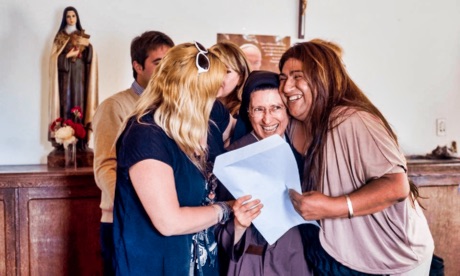The term “LGBT” was used for the first time in a Vatican document.
The working document for the 2018 Synod on the Youth noted, “Some LGBT youth…wish to benefit from greater closeness and experience greater care by the Church.”
Sister Monica Astorga, an Argentinian Discalced Carmelite Nun, has been working with transgender women since 2005.
In a June 2018 interview, she recounted a similar desire for among the LGBT community for “closeness” with God and the Church
“For me, God is very present in every encounter I have with trans people,” she said.
“When they arrive at the monastery, they come to ask for a hug, for someone to listen to their pain and to show them God.”
Sister Monica, whose ministry has received support from Pope Francis, is not the only Catholic sister working with the trans community.
Indeed, there are multiple stories of sisters walking with and advocating for this marginalized community.
Sister Monica recounts one story demonstrating the desire for community and hope among the women she works with:
“One day in January, on a very hot day, a 27-year-old trans girl came to me crying.
“She said, ‘Sister, please tell me about God.’
“After a long talk, she asked me to help her out of prostitution.
“She told me how much of a torment it was to be on the streets.
“Now, years later, she has been working in a clinic for over a year and is studying at the university.”
Sister Monica’s call to work with the transgender community came when a trans woman was referred to the Carmelite Monastery after donating to her local parish.
In speaking with the woman, Sister Monica asked about her dreams for the future.
The woman’s dream was simply to die in a clean bed.
From that conversation, Sister Monica knew God was calling her to walk with these women.
She began regularly inviting trans women to the monastery.
What followed was a move to uncover their dreams hidden beneath pain and abuse. Sister Monica’s desire became clear: to help the women pursue their revealed aspirations.
In the beginning, she said, “Many did not have any dreams.
They lived day-to-day wondering who would be the next to die.”
Through monthly prayer and support meetings, the women began to hope for a life without prostitution, going back to school, and having a safe home to live in.
Due to discriminatory hiring practices, work is hard to come by for trans people.
Sister Monica set out to create employment opportunities whereby the women would have the means to earn money outside of prostitution.
Sister Monica worked with the local bishop to find an old house that could be converted into a home for these women.
She turned part of the house into a sew-shop and beauty salon where the women work and earn money.
She’s currently adding a full-time residence for drug and alcohol addiction recovery.
Recently, Sister Monica worked with her government to purchase an old apartment building which is being renovated into 12 apartments for trans women with delicate health.
Sister Monica laments the low life expectancy for transgender individuals, which in Argentina is 40 years. Continue reading
- This post is edited from its original, published on August 1, 2018 – A Beautiful Bond: Argentinian Nun Ministers to Transgender Women
- Image: Jesuit Post
